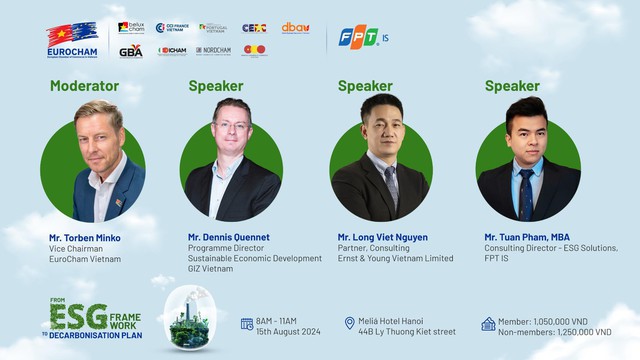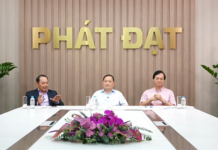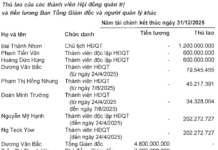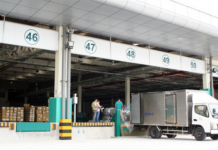The event aims to share knowledge and practical experience to help Vietnamese businesses accelerate their green transition, improve production processes, and implement emission reduction solutions towards Net Zero, ensuring compliance with international ESG standards.
The workshop, “From ESG Frameworks to Decarbonisation Plan,” featured leading ESG experts, including Mr. Torben Minko, Vice President of the European Business Association in Vietnam (EuroCham), Mr. Pham Tuan, Master of Business Administration in Europe and Product Director of VertZéro from FPT IS, Mr. Dennis Quennet, Project Director of Sustainable Economic Development at GIZ Vietnam, and Mr. Nguyen Viet Long, Deputy General Director of Consulting at Ernst & Young Vietnam (EY Vietnam).
With commitments made at the 26th United Nations Climate Change Conference (COP 26) and the implementation of the Carbon Border Adjustment Mechanism (CBAM), Vietnamese businesses, especially those in manufacturing, face significant challenges in emission inventory and sustainable development practices.

FPT IS and EuroCham host the workshop, “From ESG Frameworks to Decarbonisation Plan,” for Vietnamese businesses.
Currently, Vietnamese industries, such as iron and steel, cement, aluminum, fertilizers, electricity, and hydrogen, are subject to CBAM when exporting to the EU. Since October 1, 2023, companies in these sectors have had to report on their greenhouse gas emissions and reduction measures. Given the strong trade relationship between Vietnam and the EU, the impact of CBAM on Vietnam could become more significant if its scope is expanded to cover other goods in the future.
However, many Vietnamese businesses are not yet ready for the green transition and lack the necessary prerequisites. Carbon calculation remains a challenge due to the associated implementation and compliance costs. In fact, only 10% of organizations accurately measure their total greenhouse gas emissions, according to a BCG survey published in October 2021.
Technically, there are inconsistencies in the reporting and calculation methods due to inconsistent data collection approaches, especially for emissions along the value chain. Additionally, businesses need to understand international regulations and standards to ensure accurate reporting and set appropriate emission reduction targets based on their industry, scale, and business objectives.
Recognizing these challenges, FPT IS, a pioneer in developing green transition technologies, has partnered with EuroCham to organize the workshop, “From ESG Framework to Decarbonisation Plan.” With their expertise in international ESG standards and practical experience in green transition implementations, the experts will provide insights into the global regulations and requirements for emission reduction targets, helping businesses outline a clear decarbonization roadmap that aligns with the world’s NDC 2022 or SBTi targets, combined with the MACC (Marginal Abatement Cost Curve) from the World Bank.
FPT IS is one of the pioneers in Vietnam in providing greenhouse gas inventory solutions with VertZéro. This solution digitizes the process of collecting and processing environmental data and assists businesses in emission reporting, complying with international standards such as ISO 14064, GHG Protocol, and other Vietnamese and international standards. Recently, VertZéro was chosen by the Tran Duc Group to implement emission inventory practices across the entire enterprise (Scopes 1, 2, and 3), helping them achieve their Net Zero goals in Production, Architecture, and Construction.
EuroCham, the European Business Association in Vietnam, is a leading voice for the European business community in the country. With its extensive network and influence, EuroCham plays a crucial role in shaping policy discussions, promoting trade and investment, strengthening economic relations between Europe and Vietnam, and fostering sustainable business practices.
The event also featured the participation of leaders and experts from EY Vietnam and GIZ Vietnam. As a leading business consulting organization with over 20 years of experience in providing sustainable development services, EY supports businesses throughout their sustainability journey in four main areas: strategy development, governance and operations, enabling transformation, and building trust. This includes Carbon Emission Reduction and Climate Change Services. GIZ, a German government-owned enterprise, supports the German government in achieving its international cooperation goals for sustainable development. GIZ’s activities in Vietnam focus on four priority areas: sustainable economic development, vocational training, energy, and environmental policy and resource-efficient sustainable development.
Businesses can register for the workshop at: https://eurochamvn.org/vi/events/breakfast-talk-from-esg-fram-work-to-decarbonisation-plan/
Exporting Steel in 2024: Overcoming Two Major Barriers for Sustainable Growth
To enhance the competitive edge in the steel industry, experts recommend that businesses optimize technology, conserve energy, and implement product quality standards as regulated.


















